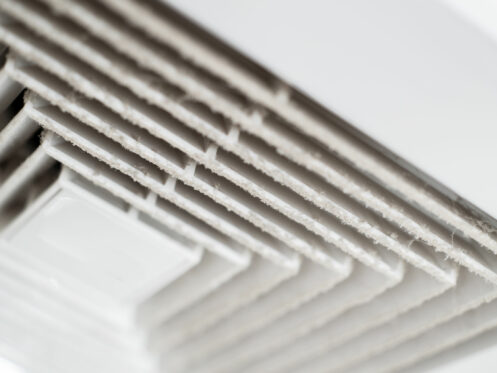Updated January 18, 2024
Air pollution in Des Moines, Iowa, homes can come from various sources. People create some sources of air pollution, and others occur naturally. Smoke, gas, volcanic ash, and dust particles all fall under the category of air pollution.
How Air Pollution Affects Asthma Sufferers
Research has proven that indoor and outdoor air pollution can worsen asthma symptoms. Older adults have an increased chance of visiting the emergency room with breathing problems when air pollution levels are high.
Airborne particles, including small particles that can pass through a person’s nose or mouth and find their way into the lungs, significantly contribute to asthma-related issues. People with asthma have an increased risk when they continually breathe these particles. Long-term and short-term exposure can cause health problems that reduce lung function.
A variety of sources can cause indoor air pollution. Homes that have poor ventilation can contain a higher concentration of pollutants. When there is good circulation, fresh outdoor air can dilute some of the emissions from indoor sources such as furniture, carpet, pets, and paint on the wall.
Additionally, homes with indoor air pollution sources, like tobacco products, residue from products used for cleaning and maintenance, excess moisture, or even deteriorated asbestos-containing insulation, can all put people with asthma at risk. Improving the home’s indoor air quality is often beneficial in helping asthma sufferers breathe easier.
Minimize Exposure to Allergens
Allergens are a severe asthma trigger. Common indoor allergens include mold, dust mites, pet dander, and residues left behind by insects like cockroaches. Keeping the home environment clean is the best way to neutralize allergens. Dust mites require soft spaces where they can find a sufficient amount of food. Unfortunately, dust mites can eat a variety of things, including skin cells shared by humans left behind in soft carpets, furniture, mattresses, and pillows.
When indoor spaces are kept uncluttered, sheets and bedding are washed regularly in hot water, and a floor is swept and vacuumed, allergens can be reduced, minimizing the effect on asthma sufferers. Some homeowners have benefited from keeping their doors and windows closed during summer to prevent pollen and outdoor allergies from entering the house.
Additional steps include removing furniture and carpets that can trap allergens and keeping pets off furniture that can collect allergens. Some homeowners have opted to have HVAC professionals install a whole-house dehumidifier. This reduces moisture and prevents the growth of mold spores, which are a contributing factor to asthma issues.
Clean the Home’s Air With a Whole-home Air Cleaner
When you have an HVAC technician install a whole-home air purifier, you are installing a system designed to capture particles like smoke, dust, pollen, and small debris. Air purifiers do not purify radon or remove volatile organic compounds (VOCs), however.
Whole-home air purifiers offer several advantages over portable units. They may help alleviate asthma symptoms by filtering allergens from the air. They can reduce the severity and occurrence of hypersensitivity episodes that trigger asthma.
Whole-home air filtration systems are an excellent option for individuals living in cities with moderate traffic as they can help eliminate some toxins from entering the home’s air supply. Many are surprised to learn that home air purifiers with HEPA filters are economical. These appliances are larger than portable purifiers and might remove more toxins and allergens.
Use Dehumidifiers and Humidifiers
A humidifier or a dehumidifier can help control the moisture in the air in your home. Excess humidity or excessively dry air can create conditions that can trigger an asthma attack. A whole-house humidifier works by taking hot water and converting it into steam. The steam gets forced through the home’s existing ductwork.
The winters in Iowa are extremely cold, so a furnace is required in all houses. A furnace can dry out the air in the home, triggering asthma symptoms. Additionally, dry air can lead to dry skin and dry eyes. A whole-home humidifier or dehumidifier installed by our professionals at Golden Rule can help keep moisture levels in check, making the air in the home better suited for allergy sufferers.
Have the Ductwork in Your Home Cleaned
Dirty ductwork can circulate pollutants through the home that trigger asthma symptoms. Many homeowners are surprised to learn that their air ducts can get dirty in the first place. Researchers estimate that more than 40 pounds of dust get created annually in a six-room home. And this is just through living a typical life. Some dust finds its way into furniture, clothing, and other possessions. However, a good portion of it gets suspended in the air.
These contaminants, including dust, smoke, chemicals, pollen, and mold, circulate and recirculate through your HVAC system several times daily. Even though your HVAC system has a filter, the filter cannot remove all contaminants. With time, the circulation causes contaminants to build up in the ductwork.
It is recommended that you have your ductwork cleaned by HVAC professionals if you see substantial mold growth in your HVAC system’s sheet metal or other components. If you have insulated air ducts, this cannot be effectively cleaned. However, our professionals at Golden Rule can work with you to have the affected areas removed and replaced. If the conditions that cause mold growth to happen in the first place are not fixed, mold growth will recur, potentially triggering asthma symptoms.
In some homes, air ducts become infested with vermin, including rodents and insects. If this is the case, our technicians will evaluate the condition of your ductwork. Before recommending cleaning, we will identify the issues that cause the problem in the first place and take steps to help you prevent them from reoccurring.
During a professional cleaning, the supply and return air ducts, grills, registers, and diffusers in your HVAC system are cleaned. Heating and cooling coils, heat exchangers, fan housing, fan motor, and air handling unit housings are also cleaned.
The cleaning must be thorough because failing to clean just one part of a contaminated system, especially if mold is present, could result in re-contamination. In the end, cleaning the ductwork in your home could be a practical step to improve indoor air quality, thereby minimizing the symptoms of people living with asthma.
Experiencing HVAC Excellence in Des Moines
At Golden Rule, we have provided stellar HVAC service in the Des Moines area for over two decades. We see ourselves as more than just a company; we are a family. Our core values are respect, understanding, loyalty, expertise, and service. We want to ensure that every one of our customers is taken care of to the best of our ability, regardless of the job you ask us to do.
Our services include HVAC repair, installation, and maintenance. We install and maintain ductless AC, heat pumps, boilers, and geothermal systems. We offer drain cleaning, plumbing maintenance, water heaters, and sump pump installation. Our electrical services include electrical repair, electrical remodeling, switches and outlets, ceiling fan installation, and smoke alarm installation. Contact Golden Rule today and experience the benefits of working with a company that puts you first.
Contact Us Today for Indoor Air Quality Service!
If you found this post helpful, check out some other budget-saving tips:





